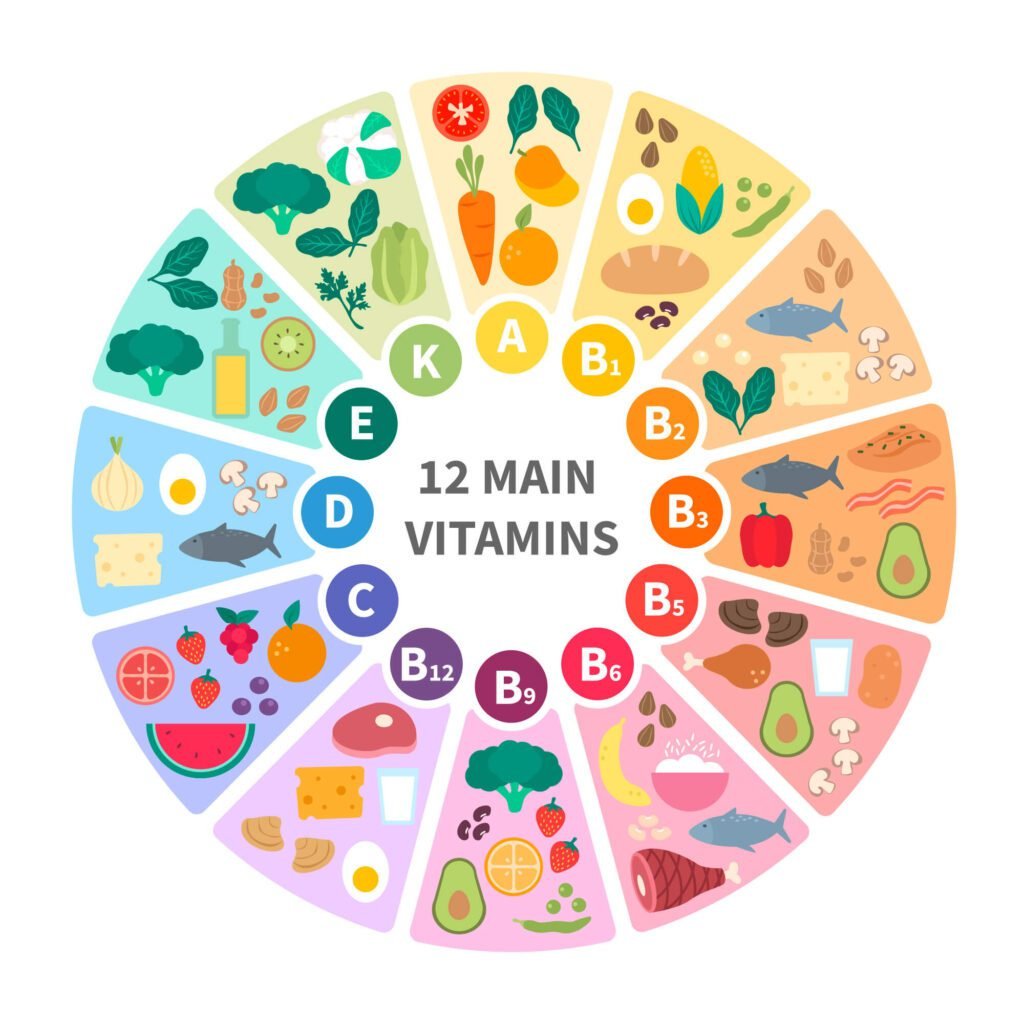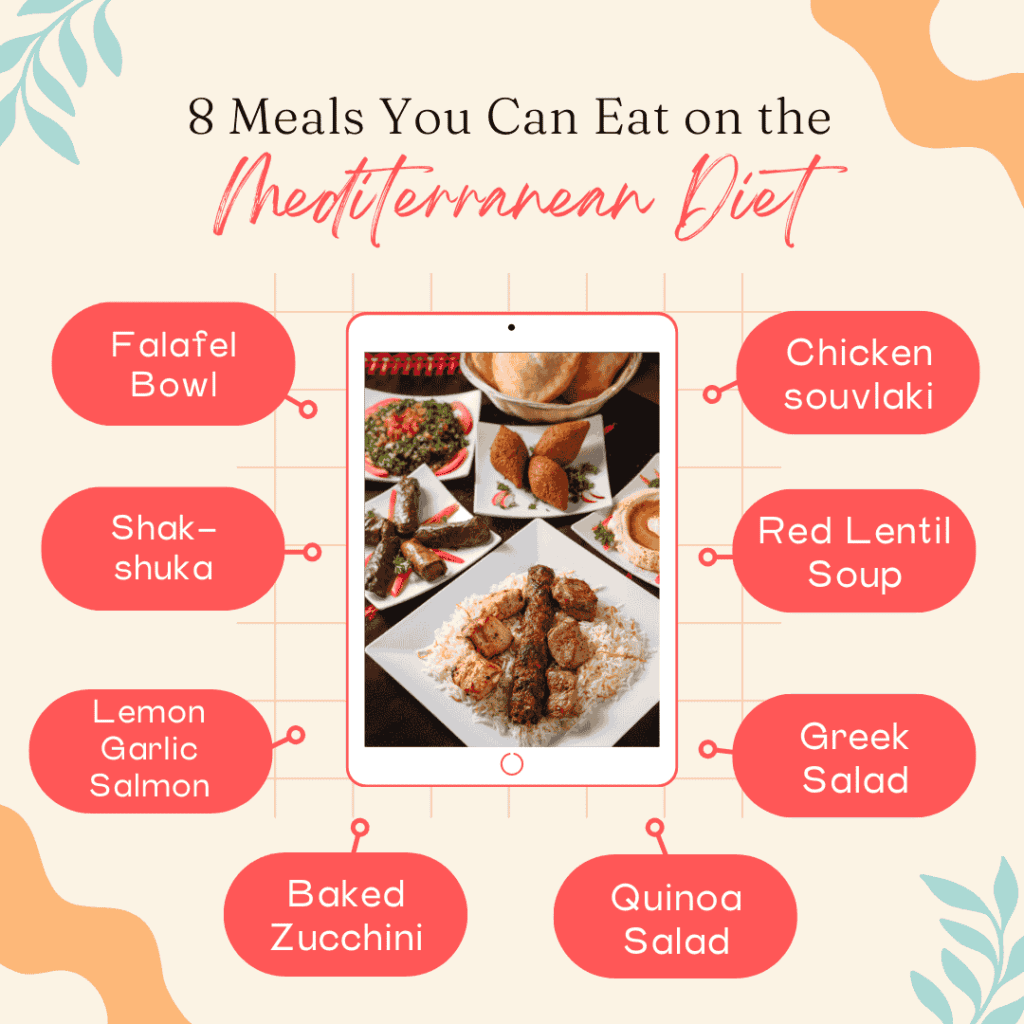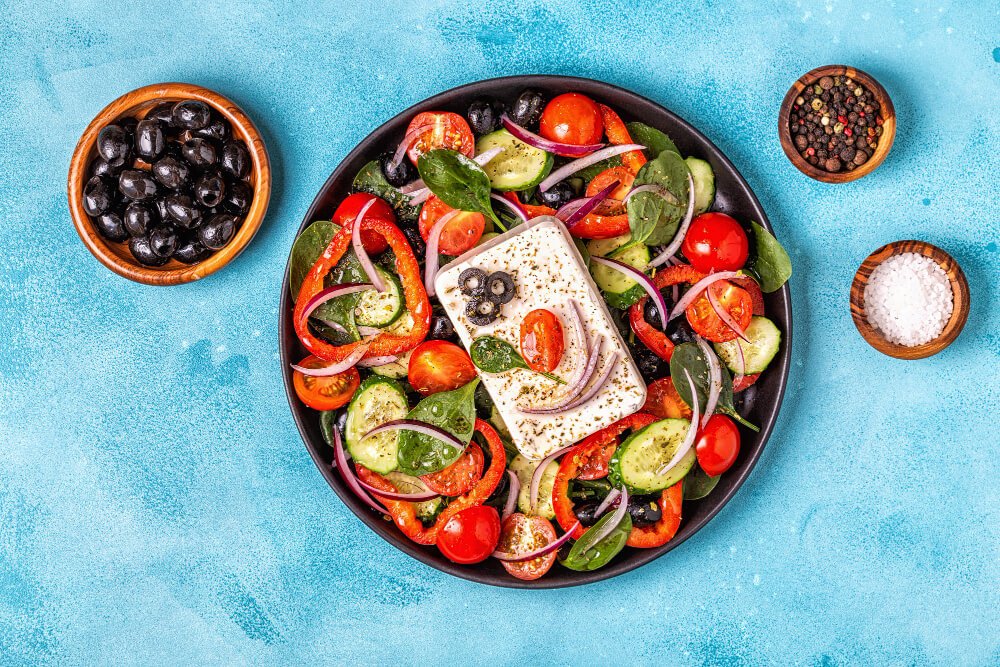The Mediterranean diet is among the top healthiest and the most delightful cuisines adored by many. It is a traditional diet that comes from Greece, Italy, and Spain that includes ingredients that are tasty and nutritious. Looking to correct your dietary plans?
You need not worry, for we have put together everything that you need to know about the Mediterranean diet foods nutritionists recommend to help you correct your eating habits.
Table of Contents
Defining The Mediterranean Diet

The Mediterranean diet is quite broad as it centers on the consumption of foods that are mostly plant-based and healthy fats. It is important to note that this is not merely a diet but rather a way of living, that promotes achieving moderation for an enhanced enjoyment of food. Its noteworthy characteristics include:
- Fruits and vegetables
- Cereals
- Healthy fats such as olive oil
- Fish and chicken
- Nuts
- Red meat and processed food in moderation
This approach also encourages people to enjoy eating together with family and friends nurturing a friendly environment that impacts a person positively.
Best Mediterranean Foods You Should Experience First Hand
1. Olive Oil: The Liquid Gold
The Mediterranean diet can’t function without olive oil. It has a high monounsaturated fat content and contains other antioxidants and components that are beneficial for the heart and anti-inflammatory. Use olive oil as a salad dressing, for sautéing, or on top of grilled vegetables.
2. Fresh Vegetables: Mighty Force from Nature
One of the Mediterranean food essentials includes cucumbers, zucchini, tomatoes, and spinach which are well balanced and healthy vegetables with high content of vitamins, minerals and fiber.
Tip: Adding vegetables to every dish prepared such as fresh salads, side meals and soups is a valuable habit to adopt.
3. Fruits: Glorious Source of Nutrients

Oranges, figs and grapes are also among the readily available foods in the Mediterranean region. These are natural sugars with a rich content of antioxidants that give instant energy.
4. Fish and Seafood: Cuisines with healthy lean proteins
Omega 3 fatty acid-rich food such as salmon, sardine and mackerel nourishes and protects the heart as well as the brain. You should consume fish and other seafood at least 2 times a week.
5. Whole Grains: Foods that provide long-lasting energy
Carbohydrate-rich foods such as quinoa, farro and barley are ranked among the flesh foods grains which include, assuring a strong energy supply and boosting satiety.
6. Legumes: Proteins from Plants
Hummus, lentils and beans are among the inexpensive but diverse foods. Their high protein, fibre and other nutrient content make them an ideal and easy addition to salads, soups and stews.
7. Essential Dairy Missing Out Creaminess
Products like Greek yogurt, and feta cheese when consumed in moderation are a great source of calcium and probiotics which provide gut health and also a creamy touch to dishes.
8. Calories Free Flavour Touch of Herbs and Spices
Mediterranean basil, oregano, rosemary, and thyme are widely used in cooking as they add flavours while cutting down on excess calories or sodium.
The Mediterranean Diet’s Benefits
1. Cardiovascular Diseases: When one adopts a Mediterranean diet olive oil and fish which are the key foods allow the user to help protect the heart.
2. Keeping Weight In Check: By increasing the intake of whole foods as well as fiber, the stomach stays fuller longer preventing overeating.
3. Better Digestive Support: The nutrient-dense fruits, vegetables and whole grains can all positively affect the amount of high fibre a person has allowing for a healthy and functioning gut system.
4. Less Inflammation: The diet includes all the foods that are rich in antioxidants allowing for overall inflammation reduction in the body.
5. Increased Lifespan: The diet is directly related to longevity promoting both healthy aging while also preventing age-related diseases as shown by numerous studies.
Creating a Mediterranean Day Meal Plan Example
Eating breakfast
- Walnuts and strawberries with honey on Greek yoghurt.
Eating Lunch
- Combination of grilled chicken or mixed vegetables such as tomatoes, cucumber, olives and all together drizzled with some olive oil and lemon.
Snacking during the day
- Mix of fresh fruit and almonds.
Dinner
- Salmon fillet grilled and served alongside an assortment of roasted vegetables and quinoa.
Dessert
- One small bowl of fresh fruit or a bite of a slice of whole grain bread with olive oil.

Mediterranean fish diet tips
1. Home cooking – this strategy eliminates the need to go shopping and allows you to prepare meals according to the requirements of the Mediterranean approach.
2. Provisioning – buy fresh produce which is in season and does not opt for anything gravitated towards processed food.
3. Easier said than done: Enjoy and take your time with your food and each meal.
4. Exercise: Eating healthy is only advantageous when it is accompanied by physical exercises.
Mediterranean diet avoiding and its pros & cons
The Mediterranean diet is arguably one of the healthiest ways of eating, along with the Intermittent Fasting and Ketogenic based eating patterns. The name is derived from long-standing dietary traditions of the countries around the Mediterranean Sea, most commonly Greece, Italy and Spain. However, as with all types of eating systems, it has rules as to what constitutes its framework which is what foods to avoid and what are some of the pros and cons. Let us now delve in.
Not Allowed on the Mediterranean Diet
The Mediterranean eating pattern is quite liberal, being more of a perfect balance but there are foods that should be curbed from or eliminated to fully appreciate and enjoy:
Added other nasties include: Refined sugars, Processed foods, Refined grains, Unhealthy fat\, Red and minced meat: and Butter and cream.
Merits Of Mediterranean Diet
The Mediterranean diet is far more than a fad; It is a way of living with proven positive effects:
1. Heart Health: This diet prioritizes healthy fats, such as those found in olive oil and nuts, which can help lower bad cholesterol levels and promote heart health.
2. Weight Management: By emphasizing whole foods and mindful portion sizes, this diet supports effective weight loss and maintenance.
3. Rich in Nutrients: Loaded with vitamins, minerals, and antioxidants from fresh fruits, vegetables, and whole grains, it serves as a nutritional powerhouse.
4. Diabetes-Friendly: The low sugar and high fibre content of this diet assist in regulating blood sugar levels.
5. Improved Brain Function: Research indicates that this diet may lower the risk of cognitive decline and enhance memory.
6. Longevity: Individuals in Mediterranean regions often enjoy longer, healthier lives, attributed to their dietary habits and lifestyle choices.
Cons of the Mediterranean Diet
Despite its many advantages, the Mediterranean diet does come with some drawbacks:
1. Cost: Fresh fruits, vegetables, seafood, and high-quality olive oil can be pricey, making it less accessible for some individuals.
2. Preparation Time: Preparing meals from scratch requires more time and effort compared to opting for processed or fast food.
3. Limited Convenience Foods: If you’re accustomed to quick snacks, transitioning to a diet focused on whole foods may pose some challenges.
4. Portion Control: Overindulging in calorie-rich foods like nuts and olive oil can impede weight loss efforts.
5. Adaptation: Adapting to a lifestyle that emphasizes whole foods over processed options and sugars can take some time and effort.
Final Thoughts
The Mediterranean diet offers more than just a set of meals; it provides a sustainable approach to nourishing both your body and mind. By steering clear of processed and unhealthy foods and focusing on fresh, whole ingredients, you can reap numerous health benefits. However, it’s important to be aware of potential challenges, such as costs and the time needed for meal preparation, to determine if it fits your lifestyle.
Start by making small changes, like replacing unhealthy snacks with fresh fruits, and try out Mediterranean-inspired recipes. This diet is not about limitations but about fostering a balanced and enjoyable eating experience that can positively impact your health!

